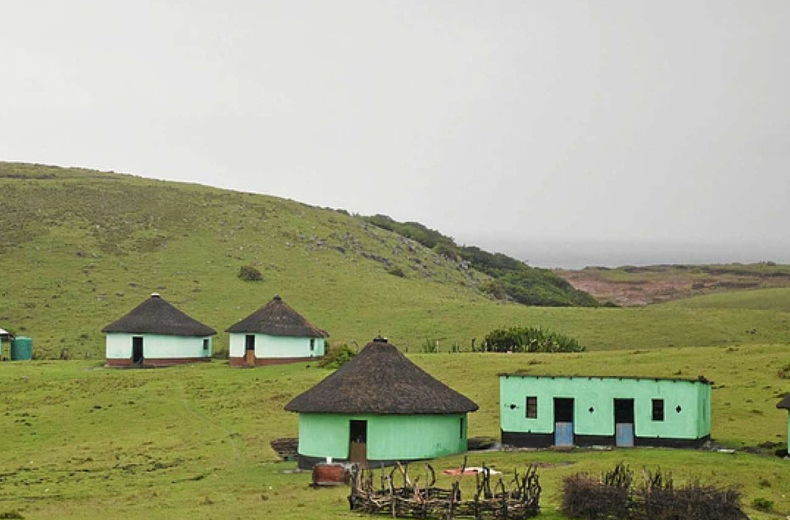This language is currently in review and will be available soon!

This essay reflects on a qualitative study that I conducted in three rural areas of the Eastern Cape in South Africa. The work was carried out over a period of three years, from 2016 to 2018. The central purpose of the research was to probe how rural women cope with domestic abuse and how they engage with support providers in order to resolve their dilemmas. The data was generated from diverse participant groups, such as women who survived domestic abuse, religious leaders, traditional leaders, community healthcare workers and grassroots organisations. Qualitative methods such as in-depth semi-structured interviews and informal group discussions were used to collect research data.
The aim for the research was to generate new knowledge and evidence to develop context-specific interventions that have the potential to effectively address domestic abuse affecting rural women. Rural women in South Africa belong to marginalised communities that are often excluded in the development of interventions and policies. Thus, they face serious inequalities, such as poor access to basic amenities, lack of access to quality education and limited employment opportunities. These were the reasons that informed the selection of three villages in Rural Eastern Cape Province were the study took place.
The key participants of the study were black women, the majority of them married for many years. Many identified as Christians from different denominations (Methodist, Zion, Evangelical and Pentecostal) and few reported that they practised spirituality. All of them articulated that they believed in God and practised religious activities, such as praying and worshiping. The religious leaders interviewed were, in turn, from different Christian denominations situated within rural black communities. They all expressed holding religious beliefs and believing in God.
Although the findings of this study resulted from a careful analysis of the raw data gathered from direct fieldwork, I wish to acknowledge that my beliefs as an African woman and a feminist may have impacted on the research. My position as a researcher has privileged me in obtaining information from the participants, and in choosing, deciding about the topic and questions to be addressed. Notably, I have personally experienced domestic violence, a fact that I shared ‘lightly’ with the survivors I interacted with, which I felt offered me an opportunity to build trust with my participants.
The study found that practising spiritual activities, such as prayer and worship, was one of the key coping strategies that many women in the study adopted in the aftermath of domestic abuse. Furthermore, they engaged primarily with informal networks such as, traditional family systems and religious networks as key support structures. The combined effect of complex religious and cultural norms was found to shape the female participants’ thinking and decision-making around how to deal with domestic abuse, whether to stay or escape abuse (Mshweshwe, 2018). Consequently, many women tended to stay longer than necessary in abusive situations. Marriage standards that were associated with religious teachings, such as ‘for better or worse, till death do us part’, appeared to be one of the factors that women struggled with when they contemplated leaving their abusive relationships.
The study found that within religious circles domestic abuse was perceived to be an ordinary family crisis, whereby wives are expected to deal with the abuse by praying for their husbands, persevering in the marriage and having faith in God’s ability to handle the situation and to bring about positive change. One of the issues that were noted was the tendency for religious leaders to advise the survivors to reconcile with their abusers and to put even more effort into making the marriages work. In the situations described, women were rarely supported to seek external or formal help to enable them to exit their abusive situations. Additionally, the notion of female submissiveness was emphasised as a key aspect of a peaceful marriage, which suggested a perception in the community that some domestic abuse was the result of women’s failure to show a non-confrontational attitude towards their husbands.
In addition to the influence of marriage ideals and standards related to religious beliefs, and the religious leaders’ unhelpful responses, the study revealed a prevalence of time-honoured cultural norms that seemed to contribute to the vulnerability of women. Women who had been married within the customary law – a law that involves ilobolo (bride’s price) – tended to seek help from the family system (within the rural context, there are family meetings, similar to courts, whereby marriage issues are resolved on behalf of couples, and this is where women would normally report domestic abuse and seek help).
Subsequently women stayed longer in abusive situations because of the pressure that their families placed on them to stay married. Given that the customary marriage involves not only the couple but their families also, divorce had to be approved by the family first. Some women explained that their families refused to grant them permission for divorce even when they faced abuse. These women attributed being denied the option of divorce to the custom of Ilobola (bride price), explaining that their parents refused to approve divorce because they did not want to return the ilobola to the groom’s family. The ilobola transaction involves the transfer of money or livestock from the groom’s family to the bride’s family in order to gain the latter’s permission to marry the bride (Chireshe & Chireshe, 2010).
An African feminist approach informed this research. This approach enabled the research to capture the realities of survivors in their cultural and religious context, allowing the stories of women to be told without losing their meanings. This was strengthened by the fact that the researcher is a Christian believer, shared the same culture with the participants, spoke the same language and had a rural background.
While culture, religion and domestic abuse intersect to form a web of vulnerabilities for many women experiencing domestic abuse in the African context, this has not been fully grasped within the mainstream feminist literature, despite the fact that cultural and religious influences are key factors in understanding the lived experiences of domestic violence amongst African women.
Historically, such lived experiences were overlooked within mainstream feminist discourses, and in the development of interventions to address domestic abuse, resulting in an unbalanced approach to descriptions of African women’s identities and the issues that they face. Issues facing African women have often been addressed through top-down approaches that have excluded local experiences, and most importantly, the context, cultural and religious framing.
In South Africa, there is still a serious need to develop interventions that capture the realities of women in their traditional and religious contexts, as well as acknowledging the major role that religious leaders play in responding to domestic abuse and supporting survivors. I believe that South Africa can learn from interventions like Project dldl/ድልድል, which seem to be making tangible positive impact in the project countries, and specifically in Ethiopia. Project dldl/ድልድል focuses on bringing together a multisectoral and multidisciplinary perspective, including religious studies, gender and development and public health, to address domestic violence in religious communities in culturally appropriate ways. Project dldl/ድልድል is informed by a decolonial approach that focuses on including the lived experiences of the Global South (Istratii, 2022), with the aim of producing research that can be used as evidence to design context-specific interventions. It also aims to inform interventions in the European context that seek to support migrant populations and religious communities similar to those in the project countries abroad. Most importantly, the project works closely with religious leaders to integrate them in responses to domestic violence, and to impart to them knowledge that can enable them to address domestic abuse more effectively and safely in their communities. To me, this approach makes a lot of sense because it empowers religious communities to be at the forefront and to champion the response to domestic abuse while acknowledging the religious leaders’ existing, often overlooked, role in providing much-needed support to survivors, and the potential they have to contribute to response strategies and bring about lasting change.
Marriage-related religious and cultural norms in rural South African societies can influence and inhibit help-seeking among women confronted with violent or abusive behaviour at home, forcing women to stay in abusive situations. On the other hand, religious and cultural norms influence the type of support that survivors receive within their informal networks, such as the family and in religious communities. Therefore, there is a need for domestic violence awareness programmes and projects to work closely with religious leaders and communities to map bottom-up approaches that can effectively address domestic abuse, while investing in equipping religious leaders with skills and knowledge to help improve the ways in which they mediate and seek to help women experiencing domestic abuse.
Chireshe, E., & Chireshe, R. (2010). Lobola. The Journal of Pan African Studies, 3: 147-158.
Chisale, S. S. (2018). Domestic abuse in marriage and self-silencing: Pastoral care in a context of self-silencing. HTS Teologiese Studies/Theological Studies, 74(2).
Istratii, R. (2022). Programme summary and evaluation report published: Training Ethiopian Orthodox clergy to respond to domestic violence in Ethiopia. Project dldl/ድልድል: Bridging religious studies, gender & development and public health to address domestic violence in religious communities. SOAS University of London.
Mshweshwe, L. (2020). Understanding domestic violence: masculinity, culture, traditions. Heliyon, 6(10).
Mshweshwe, L. (2018). Support for abused rural women in the Eastern Cape: views of survivors and service providers. Doctoral dissertation, University of Johannesburg.

Dr Linda Mshweshwe is currently a Post-doctoral Researcher working on project dldl/ድልድል, in the School of History, Religions and Philosophies at SOAS. She has taught gender studies and family sociology at several South African institutions, including the University of Johannesburg, and the University of South Africa. Her primary research and published works are in the area of gender and domestic violence. She has been active in several community engagement roles within, and external to universities. She has worked on numerous community projects with different groups of vulnerable women including, rural women, migrant women, sex workers, and women in prison. Dr Linda Mshweshwe graduated with a PhD in Sociology from the University of Johannesburg, Master’s in Public Health, Leeds Beckett University, BA (Hons) in Social Sciences, Leeds Beckett University, UK.